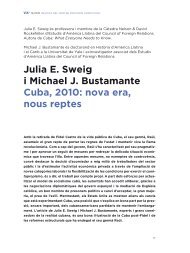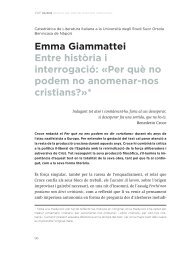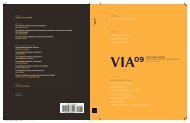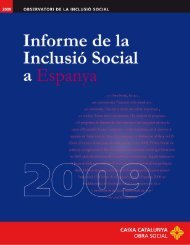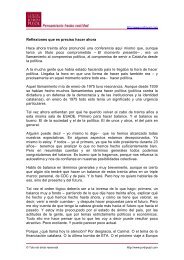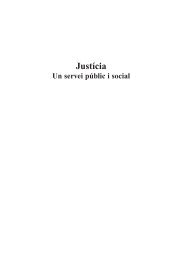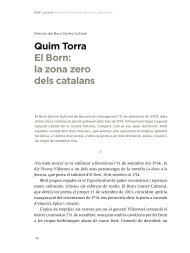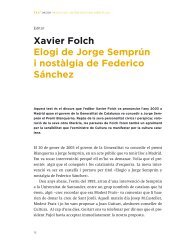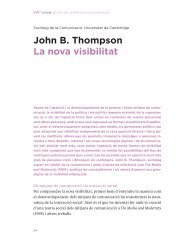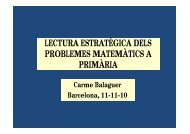Descarregar en format PDF - Jordi Pujol
Descarregar en format PDF - Jordi Pujol
Descarregar en format PDF - Jordi Pujol
You also want an ePaper? Increase the reach of your titles
YUMPU automatically turns print PDFs into web optimized ePapers that Google loves.
VIA 04 04/2007 REVISTA DEL CENTRE D’ESTUDIS JORDI PUJOL<br />
possible sc<strong>en</strong>arios faced by Scotland as a result<br />
of the victory of the Scottish National Party<br />
(SNP) in the elections held last May, but also<br />
assesses the t<strong>en</strong> years of the devolution process<br />
promoted by Tony Blair since 1997. According<br />
to Serrano, a certain success in implem<strong>en</strong>ting<br />
institutional changes and in the overall<br />
developm<strong>en</strong>t of this process has,<br />
paradoxically and beyond any diagnosis that<br />
might be made of the rec<strong>en</strong>t electoral results,<br />
meant that Labour’s vision for the future of<br />
Scotland is the one that <strong>en</strong>joys most support<br />
among the population today.<br />
Lluís Nicolau d’Olwer:<br />
a Catalan Unknown<br />
Marta Pessarrodona<br />
An undoubtedly multifaceted figure who<br />
might have be<strong>en</strong> remembered for his huge<br />
contribution to various disciplines and for<br />
whom it can be claimed –as the author does in<br />
the text– that he was historian, Hell<strong>en</strong>ist,<br />
journalist, economist, prose writer,<br />
amanu<strong>en</strong>sis and politician. However, the<br />
truth of the matter is that the life of Lluís<br />
Nicolau d’Olwer, today, is both forgott<strong>en</strong> and<br />
all-too unfamiliar in certain latitudes. In this<br />
article, Marta Pessarrodona describes the<br />
figure of an erudite man who was the leader<br />
of Acció Catalana Republicana, Minister of the<br />
Economy with Azaña and Governor of the<br />
Bank of Spain during the dramatic period of<br />
the Civil War.<br />
For a Humanist Policy<br />
Joan Lluís Pérez-Francesch<br />
In this article, the author proposes what<br />
might be considered a bona fide paradigmatic<br />
change in the world of politics. A<br />
trans<strong>format</strong>ion towards the recovery and<br />
updating of the values of humanism and<br />
personalism, with particular emphasis on<br />
public action and political struggle in the<br />
s<strong>en</strong>se of serving people and the community,<br />
rather than the attainm<strong>en</strong>t of power per se.<br />
This change in approach means, for example,<br />
that politics must reflect and define a countrydriv<strong>en</strong><br />
project, a collective project rather than<br />
tactics or marketing in its strictest s<strong>en</strong>se,<br />
more long-term than short-term. According to<br />
Pérez-Francesch this change in the way<br />
politics is conceived also involves a revival of a<br />
more deeply ethical, more transc<strong>en</strong>d<strong>en</strong>t<br />
dim<strong>en</strong>sion, from particular to g<strong>en</strong>eral<br />
interest, and with a certain spiritual<br />
anchoring of politics.<br />
Concerning Historical Memory<br />
Josep Maria Solé i Sabaté<br />
The differ<strong>en</strong>t social, academic and political<br />
projects and initiatives concerning historical<br />
memory that have be<strong>en</strong> initiated over the last<br />
few years have meant that this issue, today,<br />
has become one of und<strong>en</strong>iable importance,<br />
subject to numerous public debates. In this<br />
text the author reflects on the true meaning<br />
of and the opportunities deriving from the<br />
<strong>en</strong>couragem<strong>en</strong>t of so-called memory policies.<br />
Solé i Sabaté also, and very clearly, alerts us to<br />
the hidd<strong>en</strong> dangers in a conception of<br />
memory biased in one direction, in other<br />
words, where the interpretation of that<br />
memory does not take into account its<br />
complexity and plurality.<br />
The C<strong>en</strong>tre<br />
<strong>Jordi</strong> <strong>Pujol</strong><br />
We reproduced the editorial published by the<br />
Presid<strong>en</strong>t of the C<strong>en</strong>tre d’Estudis <strong>Jordi</strong> <strong>Pujol</strong> in<br />
the CEJP online newsletter on 15 May 2007.<br />
The main thesis of this text refers to the fact<br />
that, in Spain, as in France, the difficulty in<br />
building and consolidating a political force of<br />
the c<strong>en</strong>tre is due, among other things, to the<br />
inher<strong>en</strong>t limitations of the electoral system.<br />
This has led to a de facto situation where the<br />
most important nationalist parties in the<br />
state, namely CiU and the PNB, particularly<br />
183



